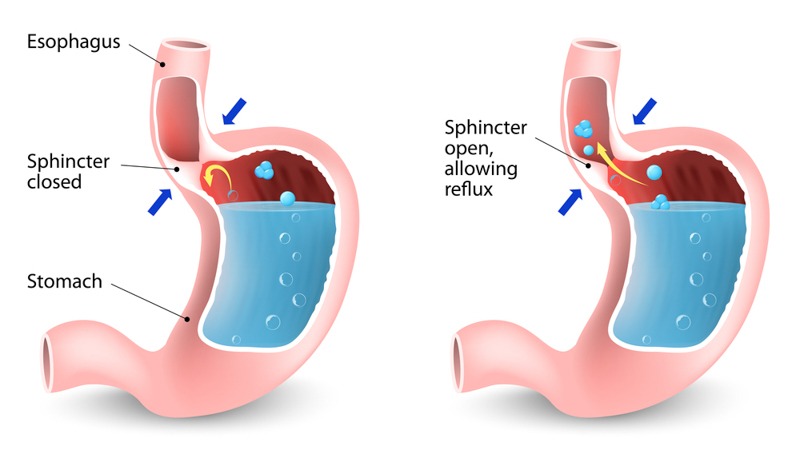If you’ve ever experienced a burning sensation in the chest after eating, especially after having something spicy, you’ve probably had acid reflux.
It’s estimated that 1 in 5 Americans experience heartburn.
The majority of people use over-the-counter medications for acid reflux, but the relief is short-lived, and the medications themselves can cause unpleasant side-effects if you take them regularly.
In recent years, many folks with acid reflux have started turning to alternative methods of treating acid reflux — one that could fight the underlying cause of the condition without causing dangerous adverse reactions.
Does CBD oil, one of the most sought-after health supplements today, help with heartburn, a.k.a. Acid reflux?
CBD oil can bring relief from many digestive issues, including acid reflux. In this article, we cover the benefits of CBD for heartburn, explain the mechanism behind the anti-reflux effects of CBD, and discuss the cannabinoid’s safety.
Understanding Acid Reflux
The gastrointestinal tract is one of the most important human organ systems. It’s also very complex and sensitive, so upsetting your digestive system can lead to the excess production or backflow of stomach acid — the trigger of acid reflux.
Acid reflux can happen when the acid in the stomach travels backward to your throat through the esophagus, which is a channel connecting these two parts of the body. This backwash often irritates the lining of the esophagus, causing discomfort around the upper abdomen.
This sensation is often accompanied by burning in the chest, known as heartburn.
People who have acid reflux experience heartburn after a large meal, drinking alcohol, or coffee.
Aside from heartburn, acid reflux may also lead to nausea, vomiting, and difficulty in swallowing. It can also give you a sore throat, produce a bad taste from the mouth, and leave your throat sore.
What Can Cause Acid Reflux?
Acid reflux can have many roots, but most commonly, it happens when the muscles controlling the channel between the stomach and esophagus don’t close properly, allowing for the backflow of acids and food in the stomach. This can irritate the tissue around that area.
Are Acid Reflux and Gastroesophageal Reflux Disease (GERD) the Same?

Acid reflux is known as gastroesophageal reflux (GER). When GER becomes regular, it can lead to chronic symptoms, causing Gastroesophageal Reflux Disease (GERD).
GER and GERD are characterized by the same symptoms, including heartburn, but GERD occurs when the symptoms trouble a person more than two times a week.
Other symptoms of GERD can include coughing, wheezing, difficulty in swallowing, and regurgitation.
Acid Reflux in Numbers
Up to 28% of the population in North America suffers from GERD (1). Contrary to popular belief, it’s the younger population (30–39 years old) that is more likely to be affected by the condition.
According to the Healthcare and Utilization Project, which is a US government-run database of hospital care information, 60% of the population has experienced acid reflux sometime during the year, with 20-30% suffering from heartburn weekly.
The organization also noted a 216% increase in hospitalizations with either a primary or secondary GERD diagnosis between 1998–2005.
How Does CBD Work for Acid Reflux?

If you want to get a better understanding of how CBD can act on the gastroesophageal tract, you’ll need to take a closer look at the role of CBD in the human endocannabinoid system (ECS).
The ECS and its cannabinoid receptors occur throughout the body, with the largest concentrations in the brain, spinal cord, peripheral nervous system, and immune cells. The ECS is responsible for maintaining homeostasis in the body, which is the state of balance between critical biological functions. It controls the memory, mood, appetite, fertility, sex drive, immune response, cognitive functioning, pain signaling, stress management, and more.
Studies have found high levels of cannabinoid receptors in the gastrointestinal tract. Cannabinoids produced by the body, as well as the plant-derived ounces, can regulate immunity, inflammation, gastrointestinal motility, gastric and intestinal acid secretion, nociception, and emesis pathways (2).
Here we explain the specific benefits of CBD for acid reflux.
CBD Has Painkilling Properties
A 2017 study performed by Swedish scientists from Astra Zeneca has found that medical cannabis, especially CBD, may help alleviate the symptoms of acid reflux and GERD (3).
The scientists attributed this effect to the activation of cannabinoid receptors CB1 and CB2, which produces pain-relieving effects in several experimental pain models, including the pain experienced in the gastrointestinal tract.
Since pain is one of the main problems with GERD, CBD’s analgesic effects have received much attention from medical researchers. An earlier study conducted in 2009 pointed to CBD as an effective anti-inflammatory agent thanks to its modulatory effects on CB1 and CB2 receptors (4).
How to Take CBD for Acid Reflux
There are plenty of ways to take CBD, from traditional products such as sublingual drops or gel capsules to fancy edibles, vapes, or topicals.
Now that we’ve established CBD can be a viable option for acid reflux, let’s take a look at the pros and cons of the most common products.
CBD Oil
CBD oil is the signature form of CBD. It comes in glass bottles with droppers attached to them for accurate dosing. CBD oil is applied sublingually, meaning you need to take it under the tongue. Once there, hold it for about 60 seconds, then swallow. Sublingual administration allows the CBD to avoid the first-pass effect in the liver. Therefore, the effects can be experienced faster than with oral or topical products. CBD, taken this way reaches peak levels in 2-3 hours.
However, CBD oil has a distinctive earthy taste that may not suit everyone. The droppers aren’t convenient for those living a busy life or for people who travel a lot. If you dislike the flavor of natural CBD oil, you can choose from other forms, such as capsules or gummies.
CBD Capsules
CBD capsules are generally softgels infused with a fixed amount of CBD. Capsules make the CBD routine easier because they don’t require you to measure out the dose with a dropper. Since each capsule contains the same dose of CBD, you adjust the number of capsules to your dosage — and voila.
The undeniable simplicity comes at the cost of absorption and the onset of effects. CBD capsules need to pass through the digestive system in order to enter the bloodstream. For some people, it can take up to 2 hours to notice the effects. Capsules are also less bioavailable than CBD oil because of that. The bioavailability of CBD capsules is measured at 20% max, meaning that up to ⅕ th of the ingested amount will enter your system.
On the other hand, capsules provide a long duration of effects — up to 10 hours.
CBD Edibles
Similar to capsules, edibles like CBD gummies are oral products, so your body will need to digest them until the CBD can produce its benefits. The most popular type of CBD edibles are gummies; each gummy bear contains a pre-measured dose of CBD to provide the user with a fun and tasty way to take care of their daily CBD routine. Again, the first-pass effect causes edibles to act slower than CBD oil or vapes.
CBD Vapes
Vaping offers the highest bioavailability of all consumption methods — up to 56% of the inhaled content makes it to your system, compared to 35% for sublingual administration and 20% for oral use. Vaporization is also the fastest way to deliver CBD to your body. Users report the first effects typically within 5 minutes after inhalation. However, these effects are relatively short-lived, lasting up to 3 hours, so if you’re looking for long-lasting relief from your acid reflux symptoms, we suggest that you opt for one of the above formats.
How Much CBD Oil Should I Take for Acid Reflux?

We don’t know, honestly.
There are no official recommendations from any of the federal agencies. The FDA hasn’t yet investigated the efficacy and safety of hemp-derived products. It may take some time until we see any federal guidelines on that subject. The CBD market is largely unregulated due to the classification of hemp products as health supplements, so there are no manufacturing and dosing standards in place.
The optimal CBD dosage for each individual depends on a range of factors such as your weight, age, metabolism, gender, the severity of symptoms, prior experience with CBD, and your unique body chemistry.
It’s best to start at the low end to see how your body responds to CBD. Experts recommend starting out with 1–6 mg of CBD for every 10 pounds of the user’s body weight. After one week of monitoring the effects, you can adjust the dosage as needed and reassess the effects after another week.
Keeping a dosage journal to write down different times and doses will help you to get a better view of how they affect the symptoms of your acid reflux.
Does Taking CBD for Acid Reflux Have Any Side Effects?
CBD is much safer than conventional anti-acid reflux medications because they don’t have severe side effects on our health. The World Health Organization (WHO) issued a report in 2017, where they acknowledged CBD as a safe and well-tolerated substance in humans. People can take up to 1,500 mg CBD daily without severe adverse reactions (5).
All that said, there are a few mild side effects associated with taking too much CBD. These include a dry mouth, dizziness resulting from a temporary drop in blood pressure, changes in appetite, and diarrhea.
Most people, however, don’t experience these adverse effects at regular doses.
One common concern among people with acid reflux is potential CBD-drug interactions. CBD is processed by the same set of enzymes that break down active ingredients in medications, so if you’re taking any prescription or OTC meds, be sure to talk to your doctor about your plans to incorporate CBD oil into your daily routine.
CBD for Acid Reflux: Yay or Nay?
Acid reflux is a condition that involves an upset stomach and the backflow of gastric acid to the esophageal tract. If you suffer from acute acid reflux, this condition can turn into a chronic disease known as Gastroesophageal Acid Reflux Disease. The less nutritious your diet, and the worse your lifestyle choices, the higher the chances of getting GERD.
CBD’s relationship with the endocannabinoid system leads to the softening of the gastrointestinal muscles, protecting them from damage. Better peristalsis of these muscles prevents fluid from traveling back to the esophagus, regulating acid secretion.
CBD has a positive effect on the digestive system. It is a promising compound in terms of the acid reflux treatment, although we need more quality research on humans to confirm the preliminary findings. If you’re considering taking CBD for acid reflux, you should consult a doctor expert on cannabis to establish the best dosage for your situation and avoid potential interactions with other medications.
References:
- Yamasaki, T. et al. “The Changing Epidemiology of Gastroesophageal Reflux Disease: Are Patients Getting Younger?”. Journal of Neurogastroenterology and Motility (2018), 24(4): 559-569. https://doi.org/10.5056/jnm18140
- Aviello, G et al. “Cannabinoids and gastrointestinal motility: animal and human studies.” European review for medical and pharmacological sciences vol. 12 Suppl 1 (2008): 81-93.
- Gotfried, J., Kataria, R., and Schey, R. “Review: The Role of Cannabinoids on Esophageal Function — What We Know Thus Far.” Cannabis and Cannabinoid Research (2017), 2(1):252–258.
- Elikottil, J. et al. “The Analgesic Potential of Cannabinoids”. Journal of Opioid Management (2009), 5(6): 341–357.
- The World Health Organization. “Cannabidiol (CBD): Critical Review Report.” Expert Committee on Drug Dependence, Fortieth Meeting, Geneva, 4–7 June 2018. Source: https://www.who.int

